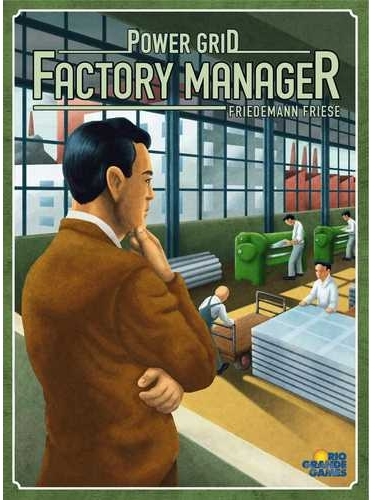Review: Power Grid Factory Manager
Posted by James (admin) on November 5th, 2009
 As someone who likes Power Grid, the idea of Power Grid: Factory Manager was very intriguing. I wondered if it was like Power Grid, or would it be too like Power Grid?
As someone who likes Power Grid, the idea of Power Grid: Factory Manager was very intriguing. I wondered if it was like Power Grid, or would it be too like Power Grid?
The goal is to earn as much money as possible in a limited amount of turns. Each player has their own factory and buys machines (to produce goods or improve efficiency) and warehouse space. Each manufacturing machine uses power and require workers if they’re not automated. Income is based on the lower of your manufacturing capacity and warehouse capacity, so you need to keep these two factors as balanced as possible and plan for expanding evenly too.
Your limited amount of workers are under great demand as workers are not only needed to run machines but are also used to bid on the turn order cards. The turn order cards that mean you take your turn towards the end of a round come with a discount on every purchase, so they can have quite an impact and going first may not be your priority. Workers are also used to buy new machines as well as remove old ones (which is important later in the game when you want to add machines but don’t have space).
 Interestingly, the machines that will be available for purchase are selected each round by the players who each, and in turn, select a number of machines to be available for purchase (based on how many workers they have available).Any player can buy any available machine and any machines not purchased in a round will be available for selection for sale again next round. This is a very interesting mechanic as you want to bring out the machine you want to purchase but ensure there are other options too in case someone else buys it before you. Your turn order in that round plays a very important part in your decisions.
Interestingly, the machines that will be available for purchase are selected each round by the players who each, and in turn, select a number of machines to be available for purchase (based on how many workers they have available).Any player can buy any available machine and any machines not purchased in a round will be available for selection for sale again next round. This is a very interesting mechanic as you want to bring out the machine you want to purchase but ensure there are other options too in case someone else buys it before you. Your turn order in that round plays a very important part in your decisions.
Each round you pay for your power usage which is simple and energy prices rise as the game continues. In our game, the price didn’t rise by much, and we all had machines that meant our power use was low anyway, so it didn’t seem that important. However, in hindsight, I can see that every Electro (the currency) counts. Twice I wanted to purchase the perfect machine for my round but was just a few Elektros short. If I’d saved 2 or 3 Elektros on power cost, things may have been very different for me (especially if the energy price had risen more rapidly as it can do).
I never bid any workers to get a turn order tile as most of my workers were committed to manufacturing, or would be needed for purchasing machines. I didn’t find this too much of a hinderance as the turn order cards seem well-balanced – going early in a round means paying full price, going later gets a discount. As a result, I mostly ended up being 2nd in turn order with no purchase discount. This didn’t bother me as the machines I wanted were always available (although I didn’t always have enough cash for what I wanted to purchase). Once again, what was critical though was for me to plan according to my turn order.
Overall, Factory Manager is an efficiency engine game (like Power Grid) but it is not a Power Grid clone and the gameplay is different. Working out which machine would best maximise profits but still be good for expansion later is tricky. Working out where manpower should be used is interesting. It’s all good, thoughtful gameplay. Even with all the thinking, I felt it played more quickly than Power Grid. The aspect I found most interesting was that you weren’t necessarily trying to be first or last in a turn – your game didn’t rely on it. Instead, you would adapt your strategy to suit your place in that round’s turn order, and that aspect was very nice. I own Power Grid already and, whilst I doubt I will buy Factory Manager, I certainly want to play it more.
Read my further thoughts in my Factory Manager Replay article too at: http://thegameofgaming.wordpress.com/2009/11/16/replay-factory-manager/
James.
[Played with 4 players]


